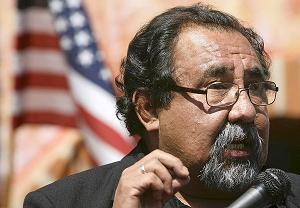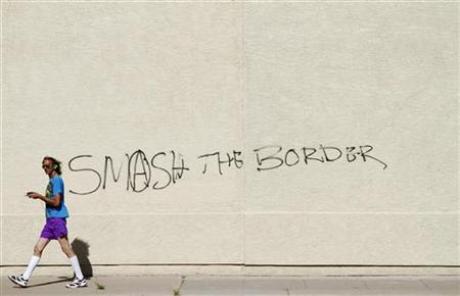 Rep. Raúl M. Grijalva of Arizona has been characterized as passionate, outspoken and just plain stubborn.After he called for a boycott on his own state because of its new immigration law, his office received death threats.But he didn’t back down. Instead, Grijalva continued to denounce the law, calling it “racially motivated.”Such is the style of Grijalva, 62, who has become the face and voice of SB 1070 opposition in interview after interview in newspapers and on television.Unlike some politicians, Grijalva is consistent, said Rep. Trent Franks (R-Ariz.), who calls the Democrat his political “diametric” opposite. “I haven’t seen him change his perspective hardly ever.”
Rep. Raúl M. Grijalva of Arizona has been characterized as passionate, outspoken and just plain stubborn.After he called for a boycott on his own state because of its new immigration law, his office received death threats.But he didn’t back down. Instead, Grijalva continued to denounce the law, calling it “racially motivated.”Such is the style of Grijalva, 62, who has become the face and voice of SB 1070 opposition in interview after interview in newspapers and on television.Unlike some politicians, Grijalva is consistent, said Rep. Trent Franks (R-Ariz.), who calls the Democrat his political “diametric” opposite. “I haven’t seen him change his perspective hardly ever.”
Phoenix officials have estimated that the city could lose more than $90 million over the next five years in canceled hotel and convention center business because of the boycott. As a result, Grijalva has been called irresponsible and a grandstander.”How does that help his working-poor constituents, some of whom earn their living in the hospitality and restaurant industry in Arizona?” said Mike Hellon, the former GOP state chairman.
Grijalva, one of the most liberal representatives in Congress, places the blame with the GOP-controlled state Legislature and Republican Gov. Jan Brewer. “The irresponsibility occurred when the governor put her signature on that law,” he said.
For Grijalva, who prefers western bolos over neckties, immigration issues strike a personal chord.Grijalva’s father, “a cowboy,” migrated to the U.S. in 1945 during the bracero program, which brought in guest workers from Mexico to offset the loss of farmworkers serving in World War II. His father became a citizen, sponsored by a construction employer.
Grijalva is a Tucson native who became the first of three children to attend college. At the University of Arizona he became involved with the Chicano Liberation Committee, an organization that pushed for the recruitment of Latinos at the school and advocated for a Mexican American studies program.Grijalva said he was motivated by his parents, who pushed him to become educated.”It’s very much the immigrant tradition,” he said.
In 1972, after several years as a community organizer, he decided to vie for a seat on the Tucson Unified School District Governing Board. He lost and said he learned that he couldn’t run for an elected position by appealing solely to Latino voters.He ran again, and ended up serving on the board from 1974 to 1986. Grijalva, who makes a point of putting the accent mark on the “u” in his first name, was the first Latino elected in more than 100 years. (His eldest daughter, Adelita Grijalva, who currently serves on the school board, remembers going to protests as a child, her younger sister in a stroller pushed by her pregnant mother, Ramona.)
He moved on to the Pima County Board of Supervisors. In 12 years, he successfully advocated for a paid Cesar Chavez holiday and worked on the Sonoran Desert Conservation Plan, which seeks to protect open spaces of desert but allow for growth. He often fought with his four colleagues to secure funding for health clinics in the area.Grijalva was elected to Congress in 2002 with 59% of the vote. He’s developed a reputation for advancing environmental and labor causes, and in the last three elections, he hasn’t received less than 61% of the vote in the Latino-dominated 7th District, which includes a large portion of southwestern Arizona.
“My whole family, personal and political life sprung from that community,” he said recently of the area he represents.Rep. Steve King (R-Iowa) alluded to the district’s location when slamming Grijalva’s call for the boycott.
“I’m wondering if we look at the map of Congressman Grijalva’s congressional district, if we haven’t already ceded that component of Arizona to Mexico judging by the voice that comes out of him,” he told Fox News. “He’s advocating for Mexico rather than the United States and against the rule of law, which is one of the central pillars of American exceptionalism.”But Grijalva’s stance resonates with his voter base, said John Garcia, a University of Arizona political science professor who has known Grijalva since 1972.”He’s sort of reflecting a lot of the sentiment and frustrations and anger not just among Latinos, but people who are dissatisfied with the whole battery of anti-Latino legislation,” Garcia said.


